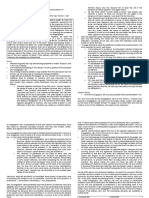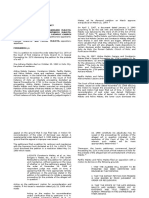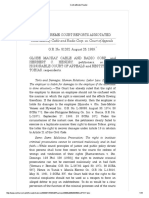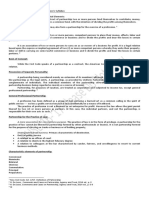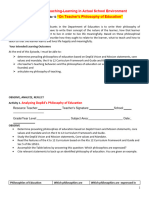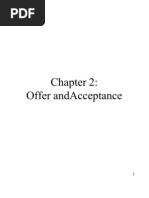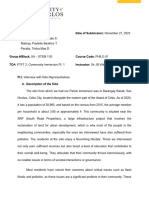Complainant Manuel L. Lee Respondent Atty. Regino B. Tambago
Complainant Manuel L. Lee Respondent Atty. Regino B. Tambago
Uploaded by
Eloise Coleen Sulla PerezCopyright:
Available Formats
Complainant Manuel L. Lee Respondent Atty. Regino B. Tambago
Complainant Manuel L. Lee Respondent Atty. Regino B. Tambago
Uploaded by
Eloise Coleen Sulla PerezOriginal Title
Copyright
Available Formats
Share this document
Did you find this document useful?
Is this content inappropriate?
Copyright:
Available Formats
Complainant Manuel L. Lee Respondent Atty. Regino B. Tambago
Complainant Manuel L. Lee Respondent Atty. Regino B. Tambago
Uploaded by
Eloise Coleen Sulla PerezCopyright:
Available Formats
Eloise
CASE 51
LEE V. TAMBAGO (A.C. No. 5281, February 12, 2008)
TOPIC: DUTY TO UPHOLD THE INTEGRITY OF THE LEGAL SYSTEM; SPECIAL ROLE OF THE NOTARY PUBLIC
FACTS:
1. Complainant Manuel L. Lee charged respondent Atty. Regino B. Tambago with violation of the Notarial
Law and the ethics of the legal profession for notarizing an allegedly spurious last will and testament
containing forged signatures of complainant’s father, the decedent, Vicente Lee Sr. and two other witnesses.
2. In the said will, the decedent supposedly bequeathed his entire estate to his wife Lim Hock Lee, save for a
parcel of land which he devised to Vicente Lee, Jr. and Elena Lee, half-siblings of complainant.
3. Summary of averments of complainant:
a. The will was purportedly executed and acknowledged before respondent on June 30, 1965.
Complainant, however, pointed out that the residence certificate of the testator noted in the
acknowledgment of the will was dated January 5, 1962.
b. Furthermore, the signature of the testator was not the same as his signature as donor in a deed of
donation which supposedly contained his purported signature.
c. Complainant further asserted that no copy of such purported will was on file in the archives division of
the Records Management and Archives Office of the National Commission for Culture and the Arts
(NCCA).
4. Court referred the case to the IBP. IBP-Board of Governors suspended respondent from the practice of law
for one year and revoked his notarial commission and disqualified him from reappointment as Notary
Public for two (2) years.
ISSUE: Whether the lapses in the subject will justify the administrative sanctions upon respondent.
RULING: YES. The law provides for certain formalities that must be followed in the execution of wills. The object of
solemnities surrounding the execution of wills is to close the door on bad faith and fraud, to avoid substitution of
wills and testaments and to guarantee their truth and authenticity. A notarial will, as the contested will in this
case, is required by law to be subscribed at the end thereof by the testator himself. It should be attested
and subscribed by three or more credible witnesses in the presence of the testator and of one another. The
will in question was attested by only two witnesses. On this circumstance alone, the will must be
considered void. The Civil Code likewise requires that a will must be acknowledged before a notary public by
the testator and the witnesses.
A cursory examination of the acknowledgment of the will in question shows that there was conspicuous absence
of a notation of the residence certificates of the notarial witnesses in the acknowledgment. Similarly, the
notation of the testator’s old residence certificate in the same acknowledgment was a clear breach of the
law. These omissions by respondent invalidated the will. The Notarial Law is explicit that notaries public are
required to certify that the party to every document acknowledged before him had presented the proper residence
certificate (or exemption from the residence tax); and to enter its number, place of issue and date as part of such
certification. As the acknowledging officer of the contested will, respondent was required to faithfully observe the
formalities of a will and those of notarization. These formalities are mandatory and cannot be disregarded.
Respondent’s failure, inadvertent or not, to file in the archives division a copy of the notarized will was NOT a
cause for disciplinary action pursuant to Art. 806, NCC: “The notary public shall not be required to retain a copy of
the will, or file another with the office of the Clerk of Court.” Nevertheless, respondent should be faulted for having
failed to make the necessary entries pertaining to the will in his notarial register. These gross violations of the law
also made respondent liable for violation of his oath as a lawyer and constituted transgressions of Section 20 (a),
Rule 138 of the Rules of Court and Canon 1 and Rule 1.01 of the CPR. Respondent, as notary public, evidently failed
in the performance of the elementary duties of his office.
VERDICT: Atty. Regino B. Tambago is hereby SUSPENDED from the practice of law for one year and his notarial
commission REVOKED. Because he has not lived up to the trustworthiness expected of him as a notary public and
as an officer of the court, he is PERPETUALLY DISQUALIFIED from reappointment as a notary public.
You might also like
- DLL Diass Week3-1Document13 pagesDLL Diass Week3-1roshell IbusNo ratings yet
- HR Performance Evaluation Policy and ProcedureDocument4 pagesHR Performance Evaluation Policy and ProcedureJumadi SuburNo ratings yet
- Lee vs. TambagoDocument3 pagesLee vs. TambagoAnj100% (3)
- Maniego Vs PeopleDocument6 pagesManiego Vs PeopleBory SanotsNo ratings yet
- Joson Vs Nario 187 SCRA 453Document4 pagesJoson Vs Nario 187 SCRA 453Weddanever CornelNo ratings yet
- Padilla v. Globe Asiatique (Effect of Dismissal of Orig Complaint To Counterclaim)Document23 pagesPadilla v. Globe Asiatique (Effect of Dismissal of Orig Complaint To Counterclaim)Yralli MendozaNo ratings yet
- De La Puerta v. Court of Appeals, G.R. No. 77867, February 6, 1990, 181 SCRA 861, 869Document3 pagesDe La Puerta v. Court of Appeals, G.R. No. 77867, February 6, 1990, 181 SCRA 861, 869Mark Lester Lee AureNo ratings yet
- PALE DagiestDocument76 pagesPALE DagiestPatrice ErniNo ratings yet
- 007 Manotok Brothers V CADocument11 pages007 Manotok Brothers V CAdorianNo ratings yet
- Rizal Commercial Banking Corporation Vs Magwin Marketing Corporation, 402 SCRA 592, May 05, 2003Document21 pagesRizal Commercial Banking Corporation Vs Magwin Marketing Corporation, 402 SCRA 592, May 05, 2003TNVTRL100% (1)
- Santiago vs. PioneerDocument2 pagesSantiago vs. PioneeranalynNo ratings yet
- New Zealand Ins. Co. v. Adriana Choa Toy 97 Phil 646 51 OG 5179Document1 pageNew Zealand Ins. Co. v. Adriana Choa Toy 97 Phil 646 51 OG 5179ChiiNo ratings yet
- Ortega v. Valmonte, G.R. No. 157451, (December 16, 2005), 514 PHIL 436-453)Document14 pagesOrtega v. Valmonte, G.R. No. 157451, (December 16, 2005), 514 PHIL 436-453)yasuren2No ratings yet
- 26 Majority Stockholders of Ruby Vs LimDocument22 pages26 Majority Stockholders of Ruby Vs LimJeah N MelocotonesNo ratings yet
- 22 Malcaba - v. - ProHealth - Pharma - Philippines - Inc PDFDocument22 pages22 Malcaba - v. - ProHealth - Pharma - Philippines - Inc PDFcg__95No ratings yet
- Galuba vs. LauretaDocument2 pagesGaluba vs. LauretaSherelyn Flores VillanuevaNo ratings yet
- Reyes V Lim and Pemberton V de LimaDocument2 pagesReyes V Lim and Pemberton V de LimaCheska Mae Tan-Camins WeeNo ratings yet
- Trust Agency 2019Document44 pagesTrust Agency 2019Devilleres Eliza Den0% (1)
- 7 Special ADR Rules Judge EcongDocument28 pages7 Special ADR Rules Judge EcongKristel Angeline Rose P. NacionNo ratings yet
- 7 Felizardo Vs CADocument8 pages7 Felizardo Vs CApkdg1995No ratings yet
- Valenzuela vs. Court of AppealsDocument22 pagesValenzuela vs. Court of AppealsTJ Dasalla GallardoNo ratings yet
- VALLE VERDE COUNTRY CLUB INC. vs. VICTOR AFRICADocument3 pagesVALLE VERDE COUNTRY CLUB INC. vs. VICTOR AFRICARal CaldiNo ratings yet
- Rafael Jose-Consing Vs PeopleDocument10 pagesRafael Jose-Consing Vs PeoplemfspongebobNo ratings yet
- Remedial LawDocument178 pagesRemedial LawEpah SBNo ratings yet
- 64.villaluz v. Land Bank of The Philippines, 814 SCRA 466Document13 pages64.villaluz v. Land Bank of The Philippines, 814 SCRA 466bentley CobyNo ratings yet
- SYLLABUS Mercantile FOR THE 2023 BAR EXAMINATIONSDocument5 pagesSYLLABUS Mercantile FOR THE 2023 BAR EXAMINATIONSJournal SP DabawNo ratings yet
- De Gala Vs Gonzales L-30289Document4 pagesDe Gala Vs Gonzales L-30289norzeNo ratings yet
- G.R. No. 230443Document13 pagesG.R. No. 230443Ran Ngi100% (1)
- G.R. No. L-65129Document2 pagesG.R. No. L-65129maprecc07No ratings yet
- Gan V YapDocument1 pageGan V YapRL N DeiparineNo ratings yet
- OBLICON - 2nd Exam Cases - FIRST PAGEDocument83 pagesOBLICON - 2nd Exam Cases - FIRST PAGESean LebosadaNo ratings yet
- Alto-Yap Vs GanDocument3 pagesAlto-Yap Vs GanMia Dela CruzNo ratings yet
- Specpro 11-26Document63 pagesSpecpro 11-26eeeee1191No ratings yet
- Cuison v. Ca2Document12 pagesCuison v. Ca2Jennilyn TugelidaNo ratings yet
- Campa CaseDocument15 pagesCampa CaseWorstWitch TalaNo ratings yet
- Coca-Cola Bottlers V AngelDocument30 pagesCoca-Cola Bottlers V AngelBernadette Luces BeldadNo ratings yet
- SPL Cases 2Document174 pagesSPL Cases 2Minnie chanNo ratings yet
- Selected ADR Case DigestDocument3 pagesSelected ADR Case DigestNeil RyanNo ratings yet
- 023 - Forest Hills Golf and Country Club, Inc. vs. Gardpro, Inc.Document18 pages023 - Forest Hills Golf and Country Club, Inc. vs. Gardpro, Inc.Maria Anna LegaspiNo ratings yet
- de La Salle Montessori Int'l of Malolos, Inc. v. de La Sale Brothers, Inc., 855 SCRA 38 (2018)Document15 pagesde La Salle Montessori Int'l of Malolos, Inc. v. de La Sale Brothers, Inc., 855 SCRA 38 (2018)bentley CobyNo ratings yet
- 2013 CASES - SuccessionDocument145 pages2013 CASES - SuccessionResci Angelli Rizada-NolascoNo ratings yet
- Natcher Vs CADocument2 pagesNatcher Vs CANC BergoniaNo ratings yet
- CRISOSTOMO vs. ATTY. NAZARENO (A.C. No. 6677, 10 June 2014) FactsDocument5 pagesCRISOSTOMO vs. ATTY. NAZARENO (A.C. No. 6677, 10 June 2014) FactsJimi SolomonNo ratings yet
- Bank of Commerce Versus Radio Philippines Network Inc. - G.R. No. 195615, April 21, 2014, J. Abad - Palomo (Digest)Document2 pagesBank of Commerce Versus Radio Philippines Network Inc. - G.R. No. 195615, April 21, 2014, J. Abad - Palomo (Digest)FRANCOIS AMOS PALOMO100% (1)
- Cox V CanadaDocument28 pagesCox V CanadaD Del SalNo ratings yet
- Globe Mackay Cable vs. CA, 176 SCRA 778Document16 pagesGlobe Mackay Cable vs. CA, 176 SCRA 778Angelie Erika PuaNo ratings yet
- Rule 90 - Reyes Vs Reyes de IlanoDocument5 pagesRule 90 - Reyes Vs Reyes de IlanoMhaliNo ratings yet
- Puno CaseDocument9 pagesPuno CaseRA De JoyaNo ratings yet
- Facts:: Camaya v. Patulandong 423 SCRA 480Document2 pagesFacts:: Camaya v. Patulandong 423 SCRA 480Rabelais MedinaNo ratings yet
- Republic Planters V AganaDocument11 pagesRepublic Planters V Aganania_artemis3414No ratings yet
- Guy vs. Guy (2012)Document23 pagesGuy vs. Guy (2012)Angelette BulacanNo ratings yet
- Sangguniang Bayan of San Andres, Catanduanes vs. Court of AppealsDocument5 pagesSangguniang Bayan of San Andres, Catanduanes vs. Court of AppealsLaura MangantulaoNo ratings yet
- Menzon Vs PetillaDocument4 pagesMenzon Vs PetillaMary LouiseNo ratings yet
- (For Public) CD - Criminal LawDocument79 pages(For Public) CD - Criminal LawRalph EarvinNo ratings yet
- Administrative Law & AdrmDocument38 pagesAdministrative Law & AdrmGOSWAMINo ratings yet
- Group 4 - Case DigestsDocument26 pagesGroup 4 - Case DigestsRikka Cassandra ReyesNo ratings yet
- GR 137592 Ang Mga Kaanib Sa Iglesia Vs Iglesia NG DiosDocument4 pagesGR 137592 Ang Mga Kaanib Sa Iglesia Vs Iglesia NG DiosNesrene Emy LlenoNo ratings yet
- Asian Terminals Inc. vs. Malayan Insurance Co. Inc.Document21 pagesAsian Terminals Inc. vs. Malayan Insurance Co. Inc.Jessica mabungaNo ratings yet
- Notes PATDocument4 pagesNotes PATᜉᜂᜎᜊᜒᜀᜃ ᜎᜓᜌᜓᜎNo ratings yet
- Lee v. TambagoDocument5 pagesLee v. TambagoSoc SaballaNo ratings yet
- Lee v. Tambago (1949)Document4 pagesLee v. Tambago (1949)delayinggratification100% (2)
- Case Digest Lee Vs TambagoDocument7 pagesCase Digest Lee Vs TambagoRolando Reubal0% (1)
- 852-b Re Complaint-Affidavit of Elvira N. Enalbes, Et AlDocument1 page852-b Re Complaint-Affidavit of Elvira N. Enalbes, Et AlEloise Coleen Sulla PerezNo ratings yet
- Principal Accomplice Accessory: Takes A Direct Part in The Execution of The Act Constituting The Crime)Document3 pagesPrincipal Accomplice Accessory: Takes A Direct Part in The Execution of The Act Constituting The Crime)Eloise Coleen Sulla Perez100% (3)
- 591-B Artex vs. NLRCDocument1 page591-B Artex vs. NLRCEloise Coleen Sulla PerezNo ratings yet
- Effects:: Article 36 Pardon (By The Chief Executive)Document1 pageEffects:: Article 36 Pardon (By The Chief Executive)Eloise Coleen Sulla PerezNo ratings yet
- Articles 100-113 QuickieDocument2 pagesArticles 100-113 QuickieEloise Coleen Sulla PerezNo ratings yet
- 41 Arrogante v. DeliarteDocument1 page41 Arrogante v. DeliarteEloise Coleen Sulla PerezNo ratings yet
- 591-C Manuel V VillalenaDocument1 page591-C Manuel V VillalenaEloise Coleen Sulla PerezNo ratings yet
- Eloise: From Execution (2) Exercise All The Rights and Actions of The Debtor, SaveDocument1 pageEloise: From Execution (2) Exercise All The Rights and Actions of The Debtor, SaveEloise Coleen Sulla PerezNo ratings yet
- Complainant Cristino G. Calub Respondent Atty. Abraham A. SullerDocument1 pageComplainant Cristino G. Calub Respondent Atty. Abraham A. SullerEloise Coleen Sulla PerezNo ratings yet
- 191 208 ShotgunDocument11 pages191 208 ShotgunEloise Coleen Sulla PerezNo ratings yet
- Rule 139-B BlueprintDocument2 pagesRule 139-B BlueprintEloise Coleen Sulla PerezNo ratings yet
- 1 Industrial Personnel & Management Services, Inc. (Ipams) v. de VeraDocument1 page1 Industrial Personnel & Management Services, Inc. (Ipams) v. de VeraEloise Coleen Sulla PerezNo ratings yet
- Juridical Personality Under The RCCP That Is Separate and Distinct From Its Persons Composing ItDocument4 pagesJuridical Personality Under The RCCP That Is Separate and Distinct From Its Persons Composing ItEloise Coleen Sulla PerezNo ratings yet
- 21 Manzano Jr. v. GarciaDocument1 page21 Manzano Jr. v. GarciaEloise Coleen Sulla PerezNo ratings yet
- RULE 139-B Disbarment and Discipline of Attorneys What Are The Forms of Disciplinary Measures in The Legal Profession?Document2 pagesRULE 139-B Disbarment and Discipline of Attorneys What Are The Forms of Disciplinary Measures in The Legal Profession?Eloise Coleen Sulla Perez100% (1)
- 591-E Interprovincial Autobus v. CollectorDocument1 page591-E Interprovincial Autobus v. CollectorEloise Coleen Sulla PerezNo ratings yet
- 591-A PNZ Marketing v. CIRDocument1 page591-A PNZ Marketing v. CIREloise Coleen Sulla PerezNo ratings yet
- Cases 101 102 RedigestedDocument2 pagesCases 101 102 RedigestedEloise Coleen Sulla PerezNo ratings yet
- Roy III v. Herbosa 2016Document7 pagesRoy III v. Herbosa 2016Eloise Coleen Sulla Perez100% (1)
- Title III Sec 22Document10 pagesTitle III Sec 22Eloise Coleen Sulla PerezNo ratings yet
- Pcidc P: Continuation of The Discussion On The Contents of The AOIDocument3 pagesPcidc P: Continuation of The Discussion On The Contents of The AOIEloise Coleen Sulla PerezNo ratings yet
- 4 Arguments 1. The Regular Courts Has Jurisdiction Since Present Case Is Not One of The Instances Provided in P.D. 902-ADocument2 pages4 Arguments 1. The Regular Courts Has Jurisdiction Since Present Case Is Not One of The Instances Provided in P.D. 902-AEloise Coleen Sulla PerezNo ratings yet
- Considered As Falling Exclusively Within The Scope of Other Types of Insurance Such As Fire or MarineDocument3 pagesConsidered As Falling Exclusively Within The Scope of Other Types of Insurance Such As Fire or MarineEloise Coleen Sulla PerezNo ratings yet
- On The Presumption of Undue Influence Where The Beneficiary Participates in The Drafting of Execution of The Will Favoring HimDocument5 pagesOn The Presumption of Undue Influence Where The Beneficiary Participates in The Drafting of Execution of The Will Favoring HimEloise Coleen Sulla PerezNo ratings yet
- Aurelio Litonjua (Pet.) Eduardo Litonjua (Resp.) : EloiseDocument1 pageAurelio Litonjua (Pet.) Eduardo Litonjua (Resp.) : EloiseEloise Coleen Sulla PerezNo ratings yet
- Sales and Barter, Lease of Property and Commodatum: - Concepts 20-31 - Specific ContractsDocument2 pagesSales and Barter, Lease of Property and Commodatum: - Concepts 20-31 - Specific ContractsEloise Coleen Sulla PerezNo ratings yet
- 31 Arts. 1771, 1773Document2 pages31 Arts. 1771, 1773Eloise Coleen Sulla PerezNo ratings yet
- Prework - Situational Leadership Styles AssessmentDocument4 pagesPrework - Situational Leadership Styles AssessmentSheilaMarieGito-SolisNo ratings yet
- ConditionalsDocument2 pagesConditionalsDaniel Alejandro Serna HerreraNo ratings yet
- Solar Exalted Character Sheet: AttributesDocument5 pagesSolar Exalted Character Sheet: AttributesDustin Turner100% (1)
- Kautilya - Theory of StateDocument38 pagesKautilya - Theory of StateHarsh GoswamiNo ratings yet
- FS 1-13Document9 pagesFS 1-13Kim Daryll LafuenteNo ratings yet
- Week 5 and 6 Explicit and Implicit Claims in Written TextsDocument2 pagesWeek 5 and 6 Explicit and Implicit Claims in Written TextsYvonne Cielo Siaron100% (1)
- Dilar DirikDocument18 pagesDilar Dirikadaliali672No ratings yet
- Direct Effect and SupremacyDocument33 pagesDirect Effect and SupremacyTaylor MairNo ratings yet
- 3 - 3.2 PartsDocument11 pages3 - 3.2 PartsAistė SadauskaitėNo ratings yet
- Data Visualization UpdatedDocument21 pagesData Visualization Updatedmahirtajuar128No ratings yet
- Cultural Federalism-Unity in Diversity in Pakistan-2021 (Urdu)Document66 pagesCultural Federalism-Unity in Diversity in Pakistan-2021 (Urdu)Jami ChandioNo ratings yet
- Organisational Development Guide For Ngos by Zaa Twalangeti PDFDocument19 pagesOrganisational Development Guide For Ngos by Zaa Twalangeti PDFZaa TwalangetiNo ratings yet
- Formation of A ContractDocument12 pagesFormation of A ContractvenisswaryNo ratings yet
- Corporate Governance and Business EthicsDocument12 pagesCorporate Governance and Business EthicsManish AnandNo ratings yet
- Organizational DevelopmentDocument13 pagesOrganizational DevelopmentArsal AliNo ratings yet
- The Teacher and The Community School Culture and Organizational LeadershipDocument11 pagesThe Teacher and The Community School Culture and Organizational LeadershipAlliana Pauline MorallosNo ratings yet
- Law of ContractDocument15 pagesLaw of ContractManikant SinghaniaNo ratings yet
- AESTHETICS, Also Spelled Esthetics, The Philosophical Study of Beauty and Taste. It Is Closely Related ToDocument7 pagesAESTHETICS, Also Spelled Esthetics, The Philosophical Study of Beauty and Taste. It Is Closely Related ToMytz AriasNo ratings yet
- Neville Bell Meng Uc 05 On Corporate ReputationDocument15 pagesNeville Bell Meng Uc 05 On Corporate ReputationKhadra HalataaNo ratings yet
- Ethic AssigmentDocument10 pagesEthic AssigmentCharles TingNo ratings yet
- Scholarship Contract: Joel B. GarciaDocument4 pagesScholarship Contract: Joel B. GarciaqwertyuiopkmrrNo ratings yet
- Chapter 2 Offer and AcceptanceDocument13 pagesChapter 2 Offer and Acceptancekathrotiya100% (1)
- Software Project Management Unit-5 - 4 PDFDocument2 pagesSoftware Project Management Unit-5 - 4 PDFMANAS TIWARINo ratings yet
- Flourishing at WorkDocument44 pagesFlourishing at Workyusma AlfiNo ratings yet
- HV QuantumDocument21 pagesHV QuantumBilal MalikNo ratings yet
- Contemporary Moral Problems (Chapter 1)Document46 pagesContemporary Moral Problems (Chapter 1)Cristine Camille Valenzona100% (2)
- PTFT 2 - Community Immersion Pt. 1 5ADocument8 pagesPTFT 2 - Community Immersion Pt. 1 5Ahellotxt304No ratings yet
- CLL307 (1) P QDocument2 pagesCLL307 (1) P QfaithocheiyomaNo ratings yet































